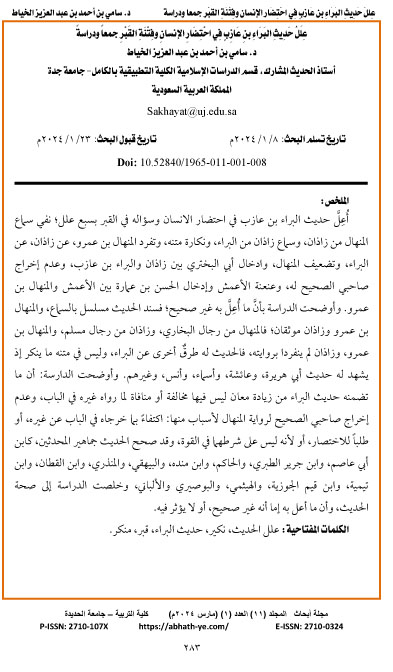Flaws of the Hadith Narrated by Al-Bara'a bin 'Aazib about a Person’s Death and the Temptation of the Grave Collection and Study
Keywords:
flaws of hadith, Nakir, Al-Bara'a's hadith, grave, MunkarAbstract
The narration by Al-Bara'a bin 'Aazib about the questioning of a person at the time of death and in the grave was criticized for seven reasons: the denial of Al-Munhal's hearing from Zadhan, Zadhan's hearing from Al-Bara'a, the strangeness of its content, the solitary transmission by Al-Munhal bin 'Amr from Zadhan from Al-Bara'a, the weakening of Al-Munhal, the inclusion of Abu Al-Bukhturi between Zadhan and Al-Bara'a bin 'Aazib, the absence of this hadith in the two Saheehs (Bukhari and Muslim), the criticism of Al-A'mash and the insertion of Hasan bin 'Amarah between Al-A'mash and Al-Munhal bin 'Amr. However, the study clarified that these criticisms are not valid; the chain of narrators of the hadith is continuous with hearing, and both Al-Munhal bin Amr and Zadhan are reliable; Al-Munhal is among the narrators of Bukhari, and Zadhan among those of Muslim. Besides, Al-Munhal bin 'Amr and Zadhan did not exclusively narrate it, as there are other chains from Al-Bara'a. moreover, there is nothing in the text of the hadith to be criticized as it is supported by the narrations of Abu Hurairah, 'Aisha, Asma'a, Anas, and others. The study further explained that the additional meanings in Al-Bara'as hadith do not contradict or conflict with what others have narrated on the subject. The two Saheehs’ exclusion of Al-Munhal's narration could be due to their satisfaction with what they have narrated on the subject from others, a desire for brevity, or because it did not meet their specific criteria. However, the hadith has been authenticated by many scholars including Ibn Abi 'Asim, Ibn Jarir Al-Tabari, Al-Hakim, Ibn Mandah, Al-Bayhaqi, Al-Mundhiri, Ibn Al-Qattan, Ibn Taymiyyah, Ibn Qayyim Al-Jawziyyah, Al-Haythami, Al-Busiri, and Al-Albani. The study concluded that the hadith is valid, and the criticisms against it are either not valid or do not affect its validity.

Downloads
Published
How to Cite
Issue
Section
License
Copyright (c) 2024 ِabhath Journal for the Humanities

This work is licensed under a Creative Commons Attribution 4.0 International License.
- البحوث المنشورة في المجلة مرخصة بموجب ترخيص (CC BY 4.0) Creative Commons Attribution 4.0 الدولي.
- تسمح المجلة بإعادة نسخ وتوزيع ونقل العمل لأي وسط أو شكل لأي غرض.
- تسمح بالتعديل والتحويل، والإضافة على العمل مع نسبة ذلك إلى المؤلف.
- حقوق النشر يحتفظ بها الباحثون.




